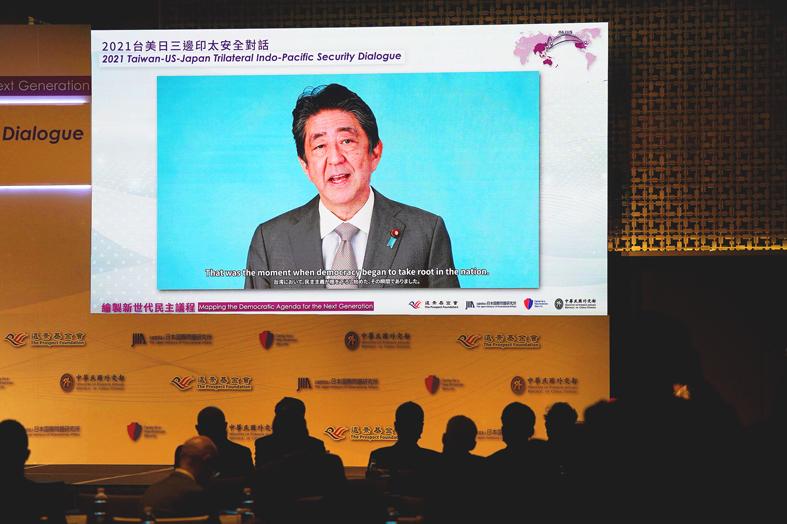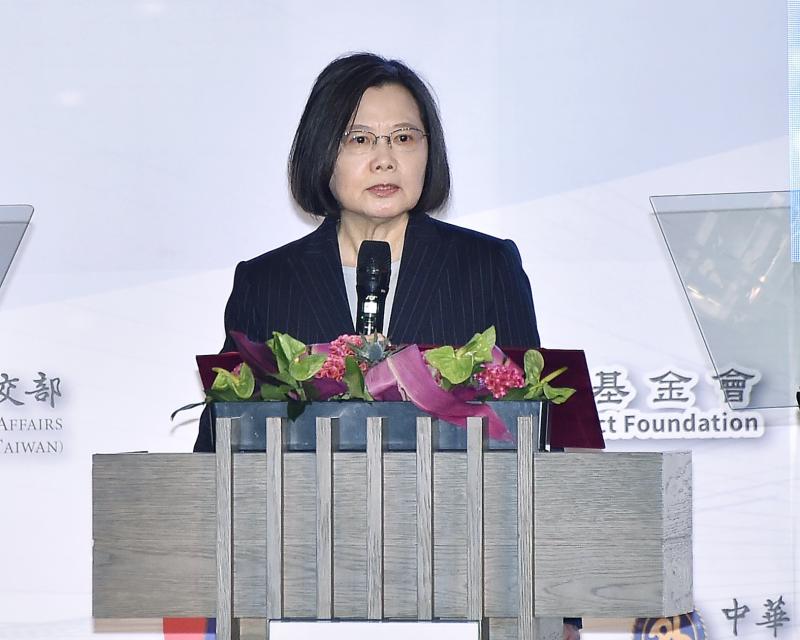Taiwan can make a greater contribution to regional development and recovery through membership in the Comprehensive and Progressive Agreement for Trans-Pacific Partnership (CPTPP), President Tsai Ing-wen (蔡英文) told a security forum yesterday.
Taipei officially applied to join the Tokyo-led trade bloc in September, “fully demonstrating its determination” to integrate into regional trade networks, she said.
The nation is prepared to further secure supply chains and work with like-minded partners to advance the post-pandemic recovery, she added.

Photo: CNA
Tsai made the comments at the opening ceremony for the Taiwan-US-Japan Trilateral Indo-Pacific Security Dialogue in Taipei. The annual forum is in its 10th year.
In a prerecorded message, Japan-ROC Diet Members’ Consultative Council Chairman Keiji Furuya told the forum that his country supports Taiwan’s bid to join the CPTPP.
“Japan firmly supports the application by the ROC [Republic of China], as one of our truly vital partners, to join the Trans-Pacific Partnership [TPP] trade agreement,” he said in English, calling the trade bloc by its former name.

Photo: Taipei Times
“In moving to help negotiate Taiwanese membership in the TPP, we eagerly look forward to the resolution of a number of related issues. Among them, the ROC ban on imports of food products from a total of five Japanese prefectures,” he added.
Following the 2011 Fukushima Dai-ichi nuclear power plant disaster, the Taiwanese government imposed a ban on food imports from Fukushima, Ibaraki, Tochigi, Gunma and Chiba.
A referendum held in November 2018 urged the government to maintain the ban, but the vote result is only legally binding for two years.
Next year marks the 50th anniversary of the break in diplomatic ties between Taiwan and Japan, while 2023 will mark the 50th anniversary of the founding of the Japan-ROC Diet Members’ Consultative Council, Furuya said, looking to further deepen bilateral bonds.
Scott Busby, acting principal deputy assistant secretary in the US Department of State’s Bureau of Democracy, Human Rights and Labor, also voiced support for Taiwan and praised its democracy.
“It is remarkable how far Taiwan has come in less than 30 years from that time [of authoritarian rule], showing the world how to build and sustain a democratic society. It shows that democracy can thrive in Asia, despite some who claim to the contrary,” Busby said.
Taiwan’s participation in last week’s Summit for Democracy hosted by US President Joe Biden was significant evidence of Taiwan’s leading role in this regard, he said.
Busby went on to praise Taiwan’s leading global role in economic issues, healthcare, digital literacy and overall prosperity, as well as its role in combating disinformation.
Former US national security adviser Robert O’Brien also addressed the forum.
Commissioned by the Ministry of Foreign Affairs, the event was organized by the Prospect Foundation, the Center for a New American Security and the Japan Institute of International Affairs.

DEFENDING DEMOCRACY: Taiwan shares the same values as those that fought in WWII, and nations must unite to halt the expansion of a new authoritarian bloc, Lai said The government yesterday held a commemoration ceremony for Victory in Europe (V-E) Day, joining the rest of the world for the first time to mark the anniversary of the end of World War II in Europe. Taiwan honoring V-E Day signifies “our growing connections with the international community,” President William Lai (賴清德) said at a reception in Taipei on the 80th anniversary of V-E Day. One of the major lessons of World War II is that “authoritarianism and aggression lead only to slaughter, tragedy and greater inequality,” Lai said. Even more importantly, the war also taught people that “those who cherish peace cannot

STEADFAST FRIEND: The bills encourage increased Taiwan-US engagement and address China’s distortion of UN Resolution 2758 to isolate Taiwan internationally The Presidential Office yesterday thanked the US House of Representatives for unanimously passing two Taiwan-related bills highlighting its solid support for Taiwan’s democracy and global participation, and for deepening bilateral relations. One of the bills, the Taiwan Assurance Implementation Act, requires the US Department of State to periodically review its guidelines for engagement with Taiwan, and report to the US Congress on the guidelines and plans to lift self-imposed limitations on US-Taiwan engagement. The other bill is the Taiwan International Solidarity Act, which clarifies that UN Resolution 2758 does not address the issue of the representation of Taiwan or its people in

US Indo-Pacific Commander Admiral Samuel Paparo on Friday expressed concern over the rate at which China is diversifying its military exercises, the Financial Times (FT) reported on Saturday. “The rates of change on the depth and breadth of their exercises is the one non-linear effect that I’ve seen in the last year that wakes me up at night or keeps me up at night,” Paparo was quoted by FT as saying while attending the annual Sedona Forum at the McCain Institute in Arizona. Paparo also expressed concern over the speed with which China was expanding its military. While the US

‘FALLACY’: Xi’s assertions that Taiwan was given to the PRC after WWII confused right and wrong, and were contrary to the facts, the Ministry of Foreign Affairs said The Ministry of Foreign Affairs yesterday called Chinese President Xi Jinping’s (習近平) claim that China historically has sovereignty over Taiwan “deceptive” and “contrary to the facts.” In an article published on Wednesday in the Russian state-run Rossiyskaya Gazeta, Xi said that this year not only marks 80 years since the end of World War II and the founding of the UN, but also “Taiwan’s restoration to China.” “A series of instruments with legal effect under international law, including the Cairo Declaration and the Potsdam Declaration have affirmed China’s sovereignty over Taiwan,” Xi wrote. “The historical and legal fact” of these documents, as well